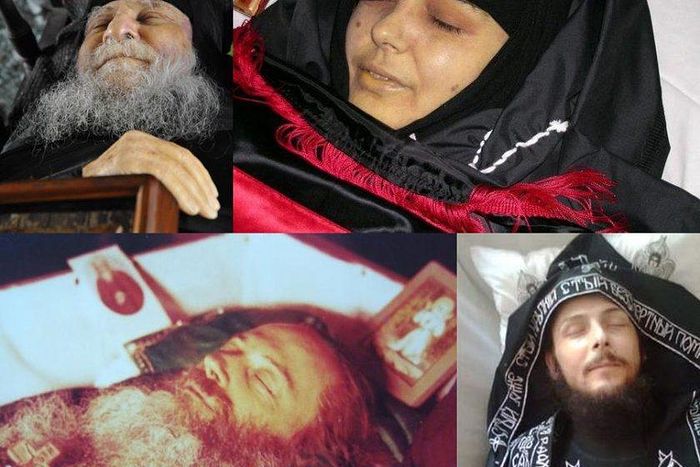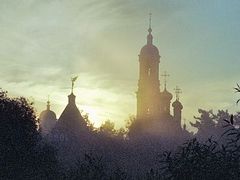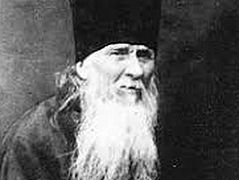 Victor Vasnetsov, Rejoice in the Lord, O ye Righteous
Victor Vasnetsov, Rejoice in the Lord, O ye Righteous
It happened in the Pochaev Lavra, during the years of the aggregating religious conflicts in Western Ukraine. In this Portion of the Mother of God there gathered a large multitude of defenders of the faith, in no rank lower than archpriest. Intellegent eyes, long beards, and serious speeches.
We discussed, consulted, groaned, shrugged, and made suggestions. There was one single subject… what to do?
Increase our prayers. Negotiate with the authorities. Seek compromises on the ground. Patiently endure—maybe it will pass. Stand firm for the Faith.
Everyone had the same problem. How to save people? How to keep parishes intact? Where to seek aid? There were more questions then answers, and everyone had his own vague understanding of the situation, but there was no acceptable answer for everyone. Nothing was said—at least not out loud.
Then, in the midst of the gloomy debates, Father Dimitry the schemamonk entered the room. He had just fallen ill. He was shivering, and dressed in a sheepskin peasant coat over his cassock, just like a villager from Bukovina1.
He listened to the speeches, and then he asked to have a word.
 Vladimir Kirillov. A schemamonk He spoke shortly and simply, in that mixture of Russian, Ukrainian, and Church Slavonic languages, with a slight Romanian accent, upon hearing which a philologist would be thrilled, but a “professional Ukrainian” would be triggered.2
Vladimir Kirillov. A schemamonk He spoke shortly and simply, in that mixture of Russian, Ukrainian, and Church Slavonic languages, with a slight Romanian accent, upon hearing which a philologist would be thrilled, but a “professional Ukrainian” would be triggered.2
“Fathers…” he said, “I have been a monk since I was a little child. And how poorly I lived…it would be frightening to remember! Whenever I bit down on my bread, blood would flow from my gums because it was so stale.3 I never ate ice cream in my entire life. And I never even kissed a girl, or held one by the hand. What did I know in life? Sour cabbage and the Seventeenth Kathisma4. I prayed and chanted to God every day, and fasted. But then I fell ill not long ago…and very gravely. I hear…feel…that death is coming. And you know… Holy Fathers… I was scared.”5
Then his voice broke down, and his eyes turned into two large wells of tears.
“Well…what did I have to look for in life?” The Schemamonk continued after a short pause, “I have been prepared for death since I was little. And… but… then it came, and I, as you can see… I was afraid.”6
He fell silent again, as if he had been precisely grasped at the throat by an invisible hand, and he no longer spoke anything. He wished Godspeed to all, and went into his cell.
And we, the “council of the defenders of Orthodoxy”7 remained. And someone else shed a tear as well. It was somehow strange to carry on our conversation about saving the Church from yet another historical disaster. Not even strange, but shameful. Because between our opulence of form, and the beauty of our awarded crosses, and other secondary signs, it became clear that our common disaster [i.e. the inevitability of death—Trans.] had not yet come to fruition.
Then suddenly, it felt like death was just behind everyone’s back, yet for some reason, no one except the schemamonk was afraid. It seems, perhaps, because we did eat ice cream when we were children, and in time, held our future wives by the hands. And so, in general, it seems there is such a rule: whoever is [spiritually—Trans.] better is more afraid [i.e. aware of his grave errors and weaknesses—Trans.], but whoever is lesser tries [and thinks he is prepared—Trans.] to tackle and solve the big questions.8
That discussion soon ended. We resolved to stand for the Faith as best as we could, according to our strength. Afterwards there was a trapeza9, and everyone went on their way. And the Church, though she suffers, still lives to this day. And the Pochaev Lavra of the Mother of God stands as a fortress in the midst of its enemies. The schemamonk has already died; peace unto his soul and dust.
God knows we all remembered that day; I remembered, and finally decided to write about it.
 Pochaev Lavra. Photo: Monasteries.org.ua.
Pochaev Lavra. Photo: Monasteries.org.ua.
***
I remember; we were singing a memorial service in a village cemetery near Kiev, for a certain reposed servant of God, whose name I can’t say. Many neighbors, mostly women, as is typical, came to bid farewell. A cemetery amidst the forest, the trees were rustling all around, quietly, green, and peacefully.
They lowered the body into the earth. We sang “Memory Eternal”, and the people began to take leave. Almost everyone in the village had someone buried nearby. And people on the path would go to their graves, some would pray, leave flowers, or remove trash. I heard one older woman at the memorial cross speaking with her husband. She looked at the photo,10 gazed at the cross and said:
“There’s so much work. I’m going to the grandkids to help our daughter. My health…you know yourself, is just like yours was. But everything is peaceful for you now, and I have so many worries here.”
She was silent for a moment.
“But don’t call me to you yet. Rest yourself. I still have so much work here. Who will help our daughter but me? Do you hear me?! Don’t call me yet! I’ll come back and visit you soon.”
She caressed the cross, and went on to the exit.
***
Contemplate for a moment, a hammer and nails. Nothing special about it, right? A hammer is, after all, one of the most ancient tools of humanity.
 Crucifixion Of Jesus Christ. sketch for the painting of Saint Vladimir Cathedral in Kiev. Artist: Victor Mikhailovich Vasnetsov.
Crucifixion Of Jesus Christ. sketch for the painting of Saint Vladimir Cathedral in Kiev. Artist: Victor Mikhailovich Vasnetsov.
But now, if it comes to pass on Golgotha, then the sound of a hammer striking the head of a nail will resound with a vastly different meaning in the mind and ear. That sound of iron striking iron was heard by the Mother of God. And it pierced her heart. The flesh of The Son was being tortured with iron, and another kind of weapon went through the womb of the Mother.
This is why prayers for a person who has approached death’s door are often dedicated to the Mother of God. And when burying a loved one, she is the best Helper. When a coffin is being sealed, and the sound of that hammer, striking the head of the nails is tormenting the consciences of the loved ones of the reposed—in this moment the Mother of God can help like no one else.
Many times, as a priest, I have seen people fall into shock at the sight of a coffin being lowered into the excavated and profound depth of a grave! What was I thinking then?
I remember clearly. I thought, the only way to avoid inevitable horror is to live life in such a way that it would not be terrifying to go to God. Then this peace and fearlessness will be passed onto all who stand at the grave.
This I understood a long time ago, but to understand something and to do something, are two totally different things11.
 Where the righteous repose... Православие.фм.
Where the righteous repose... Православие.фм.
***
“Please write your own obituary in advance, so that it can be printed in the local small newspapers. For example, ‘A good family man departed us untimely’ and so forth…around five or six lines. Speak about yourself from this perspective, as if after your death.” I would give this writing assignment to those adults who wish to do it; it is too early for children to write such things. One time in history, an erroneous obituary report about a person who was still living brought about a big change in life.
In 1888, Swedish newspapers mistakenly printed an obituary about the death of Alfred Nobel. In fact, it was his brother Emil who died. Nobel read many unpleasant things about his death. Journalists reported that “the dynamite king”, “the merchant of death”, a “blood millionaire” and so forth, had died. With horror, Nobel found out what society was thinking of him. The idea that he would remain in the memory of mankind as a “merchant of death”, and nothing more, shook him.
Thus was born the last will and testament of Nobel, and the award of the same name. The inventor of dynamite bequeathed 31 million Swedish krona to chemists, physicists, medical workers, writers, and fighters for peace, to those who succeeded in reducing the size of armies, fighting against slavery of various forms, and supporting peace among nations.
At the root of this phenomenon—the Nobel Prize—is an anecdote, an errant obituary. So, I was thinking: why don’t we all write a summary of the life we lived at some point? I bet without a doubt it’ll scare us; some will break out into a cold sweat, and from this, good life changes will be born. Mortal memory, after all, is so… creative.
1 Bukovina, in this context, Northern Bukovina is a region of Western Ukraine bordering and culturally intertwined with Romania. It generally refers to the Chernivtsi Oblast, where the current primate of the Ukrainian Orthodox Church, Metropolitan Onufry of Kiev and all Ukraine hails from.—Trans.
2 The language and speech Father Andrei is describing (see original texts in footnotes below) is related to the traditional Ukrainian phenomenon of Surzhyk, which is an often rural, unstandardized mixture of Ukrainian and Russian languages, most commonly taking the form of Ukrainian grammar and sentences augmented with Russian vocabulary. For those from a mixed Russian-Ukrainian and/or Belarusian background, this mixture is quite easy to understand, and can be almost endearing, however it would sound very complicated and convoluted, and mostly incomprehensible to someone who merely learned formal literary Russian as a foreign language in a university, and was never exposed to Ukrainian. Likewise, despite being closer to Ukrainian than Russian, the language cannot be described as literary Ukrainian by any means, and is generally almost never seen in print. This style of speech is mainly common and stereotypical in provincial Ukrainian towns of central and southeastern Ukraine, as well as along the border region between Ukraine and Russia, and may carry a “rural”, or even uneducated tone. The idea of it angering a “professional Ukrainian” is in reference to the fact that in some modern Ukrainian nationalistic circles and advocates for literary Ukrainian, this Surzhyk is looked down upon as being “not pure Ukrainian”; it is often viewed as the influence of “an occupier”, especially in modern Ukraine. This ignores the fact that the final standardization of Ukrainian occurred relatively recently, and Surzhyk is a perfectly natural regional dialect. Surzhyk can, however, also have a church association, as in this case, because this style of speech is related to the older days, before the period of communism and nationalism, in religious villages and among pious but simple Orthodox Christians who viewed the Orthodox Church itself as their nation to which they all belonged; for that reason, Father Andrei noted the mixture of Church Slavonic. In some ways, this “religious Surzhyk”, as opposed to the simply dialectical type, has been better preserved in the Russian and Ukrainian Orthodox diaspora than in modern Ukraine. The Russian Orthodox diaspora itself does have a distinctively “Little Russian” (i.e. Ukrainian) as well as Rusyn/Carpatho-Russian character to it, especially if we consider the Church Abroad (the late Metropolitan Laurus for example), and much of the early OCA. Interestingly enough, the way the Ukrainian (see above) is rendered in print is a special form called Yarizhka, which untilizes the Russian/Church Slavonic letter. It is worth noting that both Nikolai Gogol and Taras Shevchenko have recorded works in Yarizhka.
3 I.e. he could only afford bread that was stale as rock.—Trans.
4 A Kathisma is one of the 20 divisions of the Psalter (the book of psalms). Every Kathisma is comprised of several psalms save for the Seventeenth Kathisma, which is the entirety of Psalm 118 (“Blessed are the undefiled in the way”), due to the extreme length of which, is a Kathisma all to itself. In this context, he is implying that he lived a very serious and strict prayer life. He doesn’t necessarily literally mean he only read the Seventeenth Kathisma, but rather, it’s a metaphor for a very strict life of constant prayer, the Seventeenth Kathisma being a normal part of it.—Trans.
5 See the unique original text here for those interested: Отцы, – говорит, – я с малой дытыны – монах. И так бiдно жив, шо страшно вспомнить. Я колы хлiб кусав, то в мене кров по дёснам текла. Такый черствый був. А мороженого я в житти нiколы не йив. И дiвчину не то шо не цiлував, а и за руку не брав нiколы. Шо я знав в життi? Кислу капусту и сiмнадцяту кафизму. Молився Богу щодня, спiвав, постився. А ото заболiв недавно. И сильно. Чую: смерть iде. И знаете, отцi святые, я злякався.
6 Original text: Ну шо менi в життi шукать? […] Я с малых лiт до смерти готовився. А ось прийшла, и я, бачите, злякався.
7 By calling themselves the “Council of the Defenders of Orthodoxy”, the author is being self-criticizing. This does not sound arrogant or prideful in the original Russian but it rather has a sarcastic undertone. He is reexamining what they thought they were doing.—Trans.
8 The point of this message is essentially that they were trying to solve and prevent this major spiritual crisis in Ukraine, thinking they could come up with some intellectual solution together, but it had not even occurred to them how scary the concept of death itself is. So while they thought they were ready to tackle this major issue, a Schemamonk, who lives a very holy life just blew everyone’s minds so to speak, with the realization that even after living so ascetically and spiritually, he was still a little scared of death. This put everything into perspective for them. The holier and more ascetic a person becomes, the more simply he realizes how much he lacks; but the less spiritually advanced, the more he considers himself prepared. One could compare this to the Socratic concept of “I only know that I know nothing”.—Trans.]
9 A meal in an ecclesiastical setting—Trans.
10 In Ukraine, Russia, and Belarus, as well as the near abroad, it is very common for even modest tombstones to have typically black and white photos of the departed.—Trans.
11 Literally in Russian “from two different fields of berries”—Trans.



